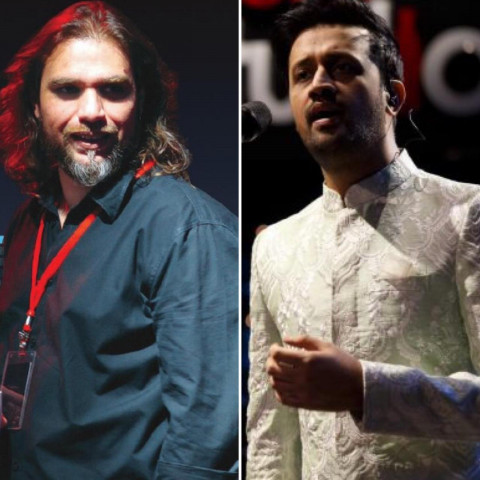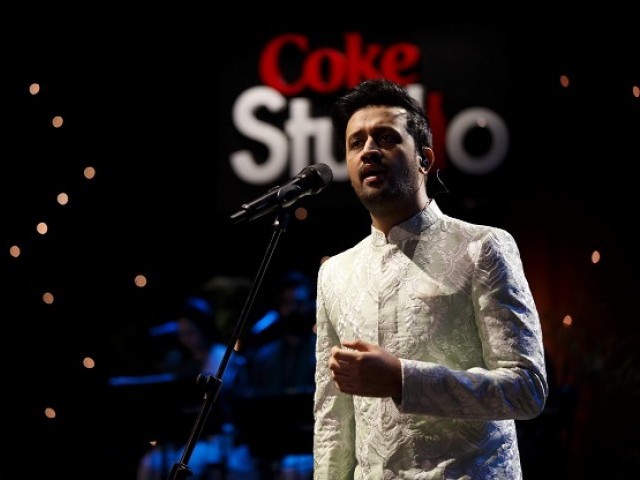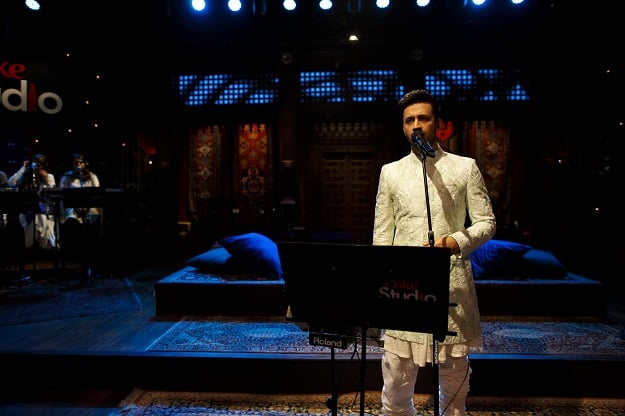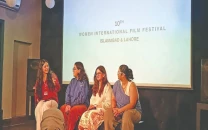Atif Aslam, Rohail Hyatt, and Coke Studio’s fruitful Friday package
With 'Wohi Khuda Hai', show has struck gold and found a formula that’ll stay relevant for another 10 seasons to...

Atif Aslam, Rohail Hyatt, and Coke Studio’s fruitful Friday package
Music, unlike visual arts is non-representational. It is the audience and their own subjectivities that give it meaning. The sonic experience is fluid yet malleable, allowing us, the listeners to choose the story we want it to tell or be a part of.
Tolkein’s lament for fallen warrior Boromir in Lord of the Rings once triggered a sense of curiosity in a student who was in a state of awe and shock to find parallels with his own Shiite tradition of lamination.
We look for emotions, symbols and even signals that may have not even existed in the creator’s head and fulfill our own need for a narrative; both as an individual and a collective(nation).
It’s a culture we practise on a daily basis and a practise that advertising and branding culture thrives on; sell happiness when you are sad, depth when you feel shallow, atonement when you have quite certainly sinned or paradoxically, shower blessings for the Muslim ummah when they are already on top of their faith game cos #Jummahmubarak.
 PHOTO: KOHI MARRI FOR COKE STUDIO SEASON 12
PHOTO: KOHI MARRI FOR COKE STUDIO SEASON 12On Friday afternoon, your foremost rockstar sang verses of God’s greatness dressed in all white. His band froze out of reverence. The expressions on his face flew between repentance and humility while you were glued to your chair in a state of awe and then respect as Holy Prophet (PBUH) and his family are mentioned.
What is indeed, and no one is doubting it, a culmination of Atif Aslam’s journey towards Allah was essentially a case study in how you merge venerative demeanor and sacred verses to offer what can at best be classified as devotional pop.
It hits the spot like a hit song but doesn’t aspire to be one, and that is where Rohail Hyatt, Atif Aslam, and Coke Studio have struck gold and possibly found a formula that’ll stay relevant for another 10 seasons to come.
With more than ten million views in three days, Coke Studio 12 is off to a fiery start. The comment sections on YouTube and Facebook is operating on a different tangent altogether, “Hit like if you want a ticket to Madina,” is one of the first comments to have appeared on YouTube, and after getting a thousand likes or so the same comment was repeated in different ways again and again.
Atif Aslam singing a popular Hamd was clearly a huge factor and so was Rohail Hyatt, but the unprecedented success of the first track also owes to the fact that it was the only track to be released.
The audience got the breathing space to absorb, gestate and reflect over a track and invest themselves without any distractions. It takes time to form an opinion about something as subjective as music and the audience, for a change got that time, till the track grew on them, leading to discourse about whether Muzaffar Warsi or NFAK would have liked this rendition at all.
Carefully timed and planned digital strategy has now raised the bar and expectations for Coke Studio 12, which the forthcoming songs will definitely not fulfill, but who cares anymore? A formula that was introduced by Strings has been mastered by Rohail, in his own, understated, minimal and visually low-key, fashion.
 PHOTO: KOHI MARRI FOR COKE STUDIO SEASON 12
PHOTO: KOHI MARRI FOR COKE STUDIO SEASON 12The visual team headed by Laal Kabootar director Kamal Khan and Zeeshan Pervez has removed all the strobe lights, fancy moving spots and made the visuals, just like the audio quite subtle, rather than one oozing Coca Cola red and blacks. It’s no longer a fancy dress show either, though the promo shows that stylists have been quite on-trend in the peppier numbers but less is more seems like an overarching philosophy for now.
On the audio front, a fellow culture writer who is also a musician pointed out that the mix of Wohi Khuda Hai reflects that Rohail has spent time with the concept of sound. You can hear each and every instrument clearly and the sum of parts add up to an overall whole; which isn’t meant to yell its presence but rather register its impact.
There are no needless breaks just a short and soft acoustic solo to complement the overall somber, meditative vibe. Perhaps that’s why Rohail chose to tune all instruments at 432 Hz, which is not the Western tuning standard, but one that is believed to represent nature’s or universe’s frequency; a number of old folk instruments, church bells etc and largely most of your meditative music is set to 432 instead of the 440Hz Western standard.
Though there is no empirical proof of whether it affects the listener's experience, a number of artists prefer 432 as an ideological choice rather than an aesthetic preference.
 Among the most downloaded songs on Taazi is Atif Aslam’s Tajdar-e-Haram. PHOTOS: PUBLICITY
Among the most downloaded songs on Taazi is Atif Aslam’s Tajdar-e-Haram. PHOTOS: PUBLICITYA bit unexpected was to notice Atif’s voice bursting out at transitions. After some incredibly seamless scale changes while reciting the lines ‘Woh.. Jaan.. Leta.. Hai..’, it breaks out of texture and key at ‘Niyattein Bhi.’
Yes, indeed it is a difficult composition to recite and Nusrat could go to spaces in the soundscape that angels feared peeping into, but still, the flips and a slight unsteadiness in his overall singing were shocking. He was certainly not as much at peace as he was with Tajdar-e-Haram, which was also a pretty difficult composition to execute.
Perhaps it was the absence of a groove? Perhaps it was the minimalistic arrangement? Or maybe it is Atif’s nightmares about classical singing coming true. “I can get classical training but will I be able to retain the soul in my expression?” he had responded rhetorically to Sajjad Ali’s question on his web show Ke Kun Kly.
It is an open secret in industry circles that Atif is taking classical singing lessons but it is too premature and farfetched to say it has affected his soul, for it was still a very well-delivered performance. Perhaps the soul is in a transitory phase. We hope so.
However, the BTS monologue by Atif seemed if not pretentious then a product of borrowed intellectualism. The father-to-son journey is indeed something very honest and personal but that approach doesn’t seem so cultivated, just borrowed from so many instances before this. It came off as pseudo-intellectual pre-cursor to Coke Studio’s powerful Friday package. But who is anyone to judge the intentions apart from Him?
Have something to add to the story? Share it in the comments below.


















COMMENTS
Comments are moderated and generally will be posted if they are on-topic and not abusive.
For more information, please see our Comments FAQ